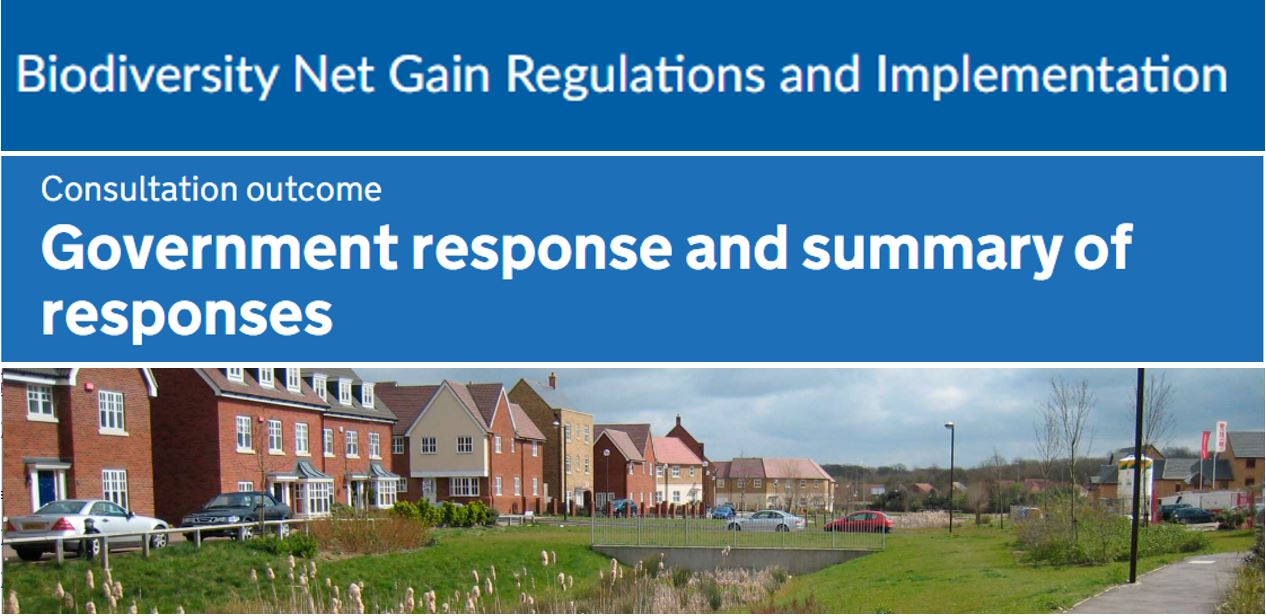Read our summary of the government response to the consultation on the forthcoming Biodiversity Net Gain Regulations
March 2023
The results and government response to the recent consultation of the forthcoming Biodiversity Net Gain (BNG) Regulations have now been published. The Regulations are set for introduction around November 2023 and will make the provision of BNG on development sites mandatory.
To assist with the implementation of BNG, the government has to date provided £4.18 million of funding to Local Planning Authorities (LPAs) to provide support in the preparation for mandatory BNG with a further £16.71 million of funding to be provided between now and November 2023.
A summary of key points from the government response to the consultation is set out below.
1. Exemptions
The government intend to make exceptions for the following:
- development impacting habitat of an area below a ‘de minimis’ threshold of 25 meters squared, or 5m for linear habitats such as hedgerows
- householder applications
- biodiversity gain sites (where habitats are being enhanced for wildlife)
- small scale self-build and custom housebuilding.
2. Irreplaceable habitats
These will be excluded from the BNG process but where irreplaceable habitats are unaffected gains can be recorded in the Metric.
3. Nationally significant infrastructure projects (NSIPS)
BNG will be required for NSIPS, but to allow NSIP developers time to prepare, the BNG requirement will not become mandatory until November 2025.
4. How the mandatory BNG requirement will work for Town and Country Planning Act 1990 development?
a) Biodiversity gain plan
Legislation requires that a biodiversity net gain plan is provided. The government has undertaken to provide a template for this but Aspect Ecology’s current reporting template provides much of the information already sought, while our expectation is that some of the information sought will also be unnecessary and create a drag on the system. Hence, we have a concern that duplication or additional work could arise with this requirement.
b) Duration of BNG
Government intends to commence mandatory BNG with 30 years set as the minimum period for which biodiversity gain sites must be secured. This will not be reviewed before 2026.
5. The market for biodiversity units
a) Supply of units to the market
Suppliers of biodiversity units will be able to sell to developers anywhere in England, provided that the use of those units is appropriate for the development in question and the distance between the development and the off-site habitat is properly accounted for in the biodiversity metric.
b) Allowing developers to sell excess biodiversity units
The government will allow developers to sell the excess biodiversity units as off-site gains for another development, provided that this excess gain is registered and that there is genuine additionality for the excess units sold. These ‘excess’ gains must be identified clearly as such in the original development’s biodiversity gain plan.
c) Creation of habitat banks
This is to be enabled which is helpful and accordingly advance habitat creation is therefore being encouraged.
6. The biodiversity gain site register
a) Register
A new biodiversity gain site register will be created, the core purpose of which will be to record allocations of off-site biodiversity gains to developments and make this information publicly available. Natural England will act as the Biodiversity Gain Site Register Operator, responsible for establishing and maintaining the register with the aim being to open the register for new biodiversity gain sites by November 2023. Government does not intend to mandate registration of on-site gains, however they agree that both on-site and off-site information on biodiversity gains should be accessible in one place and so are exploring how on-site information can be extracted from planning permissions and published on the register.
b) Habitat Management and Monitoring Plan
It will be a requirement that a habitat management and monitoring plan (HMMP) is provided as part of site registration, secured by the legal agreement. A HMMP template will be provided and may need to be followed for consistency for developers, ecologists, and LPAs.
c) Fees
A fee will be charged to register BNG sites and will be set so that all the register costs are fully covered by application fees. As a guide, Natural England expect to charge a fee between £100 and £1,000.
d) Appeals
The applicant will be free to appeal where an application for registration of a gain site is refused by the register operator.
7. Additionality / Stacking
Land managers will be able to sell both biodiversity units and nutrient credits from the same nature-based intervention, for example the creation or enhancement of a wetland or a woodland on the same parcel of land. In addition, biodiversity units may be generated on top of an existing obligation or grant payment if the land manager is able to further enhance a habitat and can establish a clear and verifiable baseline from that which the existing payment or obligation has achieved.
8. Statutory biodiversity credits
Natural England will sell statutory biodiversity credits on behalf of the Secretary of State, facilitated by a digital sales platform. Government aim to minimise the use of statutory biodiversity credits and phase them out once the biodiversity unit market has matured. An indicative credit price will be published 6 months in advance of BNG becoming mandatory. The price will be set to be intentionally uncompetitive with the market.
9. Conservation covenants
Conservation covenants are a form of legal agreement that will bind the land, which means they will apply to new landowners if the land is sold. Local planning authorities and other eligible organisations can apply to become responsible bodies and use conservation covenants which have been designed for the purpose of securing, and where necessary enforcing, positive (and restrictive) land management obligations.
The full government response to the consultation can be found here
Read our ‘Briefing for developers. Biodiversity Net Gain – The Basics’ here
Follow Aspect Ecology on LinkedIn for all our latest news LinkedIn Page


